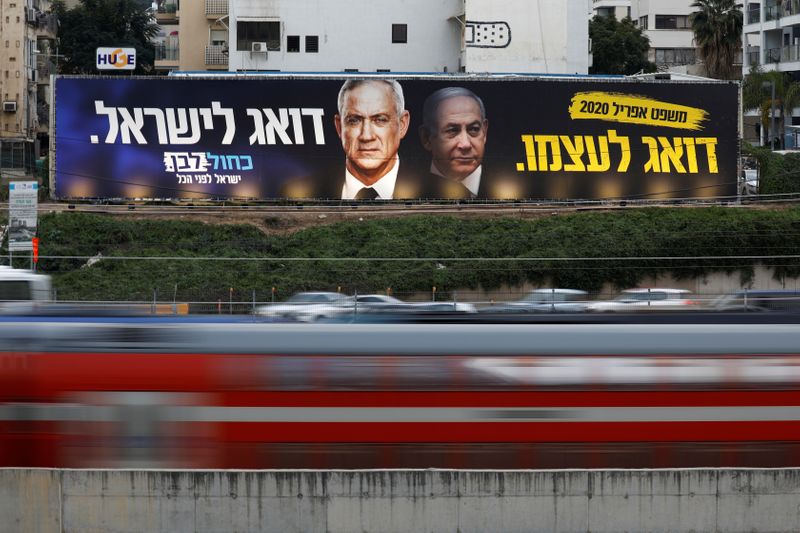By Jeffrey Heller
JERUSALEM (Reuters) - Prime Minister Benjamin Netanyahu and his main rival Benny Gantz have signed an agreement for a unity government under which they will take turns leading Israel after three elections that neither won.
Here are some questions and answers about the complicated power-sharing deal.
WHO IS PRIME MINISTER AND FOR HOW LONG?
Currently head of a caretaker government after an election on March 2 and similarly inconclusive ballots in April and September last year, Netanyahu, leader of the right-wing Likud party, will serve as prime minister of a new administration for 18 months. He will then hand over to centrist Blue and White leader Gantz, who will also serve for a year and a half.
Once the new government is sworn in - within the next three weeks - Gantz, 60, will become defence minister and also "substitute prime minister" under Netanyahu, 70. Netanyahu will be "substitute prime minister" when it is Gantz's turn to lead.
WHAT ABOUT THE GOVERNMENT'S COMPOSITION AND POLICIES?
Netanyahu's current government is comprised of right-wing and Jewish religious parties, a bloc of 59 of parliament's 120 seats. Even if some pull out over the unity deal with Gantz, the 17 legislators behind the former armed forces chief should ensure a measure of stability.
Peacemaking with the Palestinians, long on hold, is another matter.
The coalition agreement, while stating that the new government will strive for peace, may also move towards implementation of Netanyahu's plan to extend Israeli sovereignty to Jewish settlements in the occupied West Bank - de facto annexation of land Palestinians seek for a state.
Such a step, which Netanyahu said will also include formal annexation of the West Bank's Jordan Valley, would have to be approved by the United States, according to the unity deal.
U.S. President Donald Trump's Middle East plan, embraced by Israel and rejected by the Palestinians - awards Israel most of the land it captured in the 1967 Middle East war.
Under the power-sharing pact, the new Israeli government would not consider the territorial moves until July 1, to enable it to focus first on the coronavirus crisis.
WHAT HAPPENS WITH NETANYAHU'S CORRUPTION TRIAL?
As prime minister, Netanyahu can remain in office while under indictment.
His trial is due to open on May 24, after being postponed for two months because of the coronavirus crisis. By agreeing to the unity deal, Netanyahu will be able to argue his case against charges of bribery, fraud and breach of trust from the position of premier.
Should the Supreme Court intervene and rule that Netanyahu can indeed be barred from heading a government because of the criminal proceedings against him, a new election would be called, under the unity deal. A petition asking the court to step in was filed by the Movement for Quality Government in Israel on Monday.
WILL THE NETANYAHU-GANTZ ROTATION REALLY HAPPEN?
Political pundits have been sceptical that Netanyahu, Israel's longest-serving leader and dubbed "the magician" by many supporters, will actually transfer power to Gantz.
With sleight of hand in mind, the agreement calls for Gantz to take over as prime minister in the months leading to a new election should Netanyahu opt to dissolve parliament and not go through with the handover.
